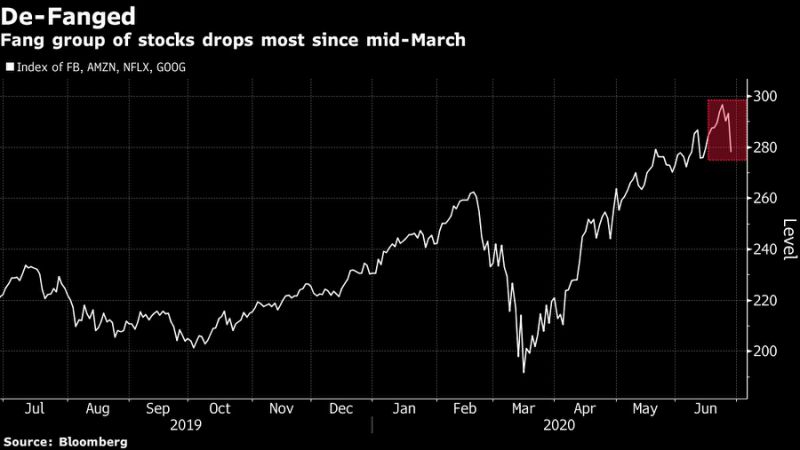(Bloomberg) — At record highs on Tuesday, the popular group of megacap tech stocks known as the Fangs is ending the week with the worst plunge since the depths of the Covid crash.
While intermittent stumbles have been a regular feature of the broad market during the recovery phase, ones involving its core constituency of the biggest online companies have been all but unheard of. The group’s automated, algorithmic, stay-at-home moat has insulated them from day-to-day ups and downs, making them a central holding of hedge funds and other institutions who have shied away from retail favorites in the airline and hospitality industries.
Combined, Facebook, Amazon.com, Netflix and Alphabet alone make up more than a 10th of the S&P 500 and near a quarter of the Nasdaq 100. Add in Apple and Microsoft — which are often grouped together to create the FANMAG stocks — and their weightings increase to 22% and 48%, respectively.
Led lower by Facebook after one of the world’s largest advertisers said it would cut ties with the social network, the amalgamation of internet stocks that has for three months been indestructible dropped more than 4% Friday, the group’s worst session since March 16.
Facebook fell as much as 8.6%, the second-worst loss for any Fang stock since the coronavirus crisis sent stocks to the fastest bear market on record. Google parent Alphabet and Netflix each dropped more than 4.5%, Amazon slipped 2.1%.
Earlier this week, all of these tech firms except for Alphabet had put their entire Covid blows behind them in the stock market. The same was true for the Nasdaq 100, up 17% in 2020 as of Tuesday.
At the end of that day, Facebook’s 18% year-to-date advance had accounted for more than 10% of the S&P 500’s performance, with only Amazon, Microsoft and Apple more significant.
Matt Maley, chief market strategist at Miller Tabak + Co., points out that Facebook’s plunge has brought its share price back below its trend line that dates back to the March 23 low. Much has been made of antitrust probes and other risks facing large-cap tech, but up until now, investors had been mostly unfazed.
“When it looks like the political tide is turning against Facebook because companies are willing to no longer advertise, that’s a big step,” Maley said by phone. “People are thinking, ‘Oh, that might give politicians more confidence to put more pressure on Facebook.’”
<p class="canvas-atom canvas-text Mb(1.0em) Mb(0)–sm Mt(0.8em)–sm" type="text" content="For more articles like this, please visit us at bloomberg.com” data-reactid=”50″>For more articles like this, please visit us at bloomberg.com
<p class="canvas-atom canvas-text Mb(1.0em) Mb(0)–sm Mt(0.8em)–sm" type="text" content="Subscribe now to stay ahead with the most trusted business news source.” data-reactid=”51″>Subscribe now to stay ahead with the most trusted business news source.
©2020 Bloomberg L.P.














